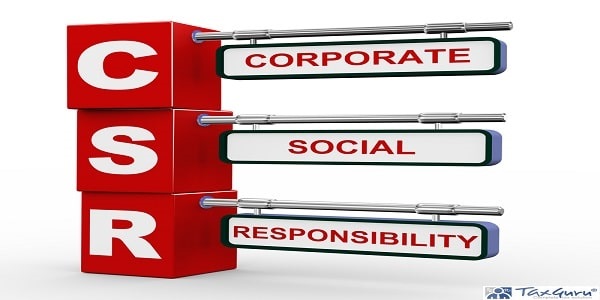
Analysis of deductionu/s 80G of expenditure on CSR activities
Published In : TAXMANN [2020] 117 taxmann.com 361 Download
Author : NAVNEET SINGAL
Whether donation can be mandatory? – Analysis of deduction u/s 80G of expenditure on CSR activities
Abstract
This article discusses the availability of deduction u/s 80G of the Income-tax Act, 1961 (‘the Act’) in respect of expenditure on Corporate Social Responsibility (‘CSR’) activities u/s 135 of the Companies Act, 2013 (‘the Companies Act’). Since, the introduction of CSR, it has been a matter of dispute under the Act, earlier in the form of treating it a business expenditure or not and now as deduction u/s 80G. This article interprets the interplay between Section 80G, Section 135 and CSR guidelines amid the recent Bangalore ITAT ruling and other case laws and try to opine that whether the deduction u/s 80G should be available or not on the CSR expenditure.
CSR rquirement in the Companies Act and related provisions in the Income Tax act
Section 135 of the Companies Act, 2013, mandates companies satisfying either of the following three conditions during any financial year to spend at least 2% of the average net profit of the company made during the three immediately preceding financial years towards CSR activities:
- Net worth of Rs. 500 Cr or more; or
· - Turnover of Rs. 1000 Cr or more; or
· - Net profit of Rs. 5 Cr or more
Further, FAQ – Query No. 6, issued under Circular No: 01/2016 Dated Jan 12, 2016 by Ministry of Corporate Affairs (‘MCA’) also describes that no specific tax exemption can be availed for the expenditure made for the purpose of CSR with a reference to amendment made by the Finance Act, 2014.
Explanation 2 was inserted by the Finance (No. 2) Act, 2014 which further explained by CBDT in the circular no. 1/2015 Dated 21/1/2015. The gist of the amendment and its explanation provided is as follows:
1 CSR expenditure is an application of income. It shall not be deemed to have been incurred for the purpose of business and hence shall not be allowed as deduction u/s 37(1) of the Act.
CSR expenditure which is of the nature described in section 30 to section 36 of the Income-tax Act shall be allowed as deduction under those sections subject to fulfillment of conditions, if any, specified therein
It is to be noted that the above explanation clearly restricts the allowance of CSR expenditure as business expenditure, however it does not discuss about the deduction u/s 80G of the Act. Further, it also mention that CSR expenditure is an application of income and section 80G of the Act provides deduction in respect of the application of Income not as an expense.
Donation u/s 80G of the Act
Section 80G was inserted by the Finance (No.2) Act, 1967 w.e.f. 1967-68 and has been there since then. In the all limbs of the section 80G, it defines that the deduction is available only on donation made to the specified funds or institutions. The meaning of donation has not been given in the Act. The dictionary meaning of word ‘donation’ read with section 80G of the Act can define the term ‘donation’ as follows:
1. It is a gift for charity, humanitarian aid or to benefit a cause. It refers to an amount paid voluntarily without any consideration as the donation is a ‘gift’.
2. Donation should be in the form of money. (Explanation 5 to Section 80G)
3. Section 80G (2) (iiihk) and (iiihl) disallows contribution to Swachh Bharat Kosh and Clean Ganga Funds, in case, it has been contributed in pursuance of CSR obligation.
Analysis of deduction u/s 80G on the basis of recent case laws
If we analyze the recent orders which has been passed by the assessing officers (AO), the deduction u/s 80G in relation to CSR has been disallowed on the following basis i.e.
1. The amount has not been paid by the assessee voluntarily as it is mandatory under the Companies Act, hence the element of charity is missing in it.
2. The concept of CSR spends was introduced to make the corporates to share the burden of the Govt to provide benefits to the society by and large. Allowing deduction u/s 80G will result in subsidizing these expenses incurred by the corporates which is not the intent of the legislature.
3. U/s 80G contributions is required to be restricted to the PMs relief fund and Govt Funds which has been specifically mentioned in SH VII of the Companies Act, 2013, as insertion of these activities is a well thought act on the part of the Govt. The reduced tax collection on account of 80G deduction would ultimately be offset by direct contribution received by the Govt. from the corporates.
ITAT, Bangalore in the case of Allegis Services (India) Ltd, ITA No. 1693/Bang/2019 Dated: April 29, 2020, has allowed the deduction u/s 80G in respect of the CSR expenses is a welcome ruling and will provide a lot of relief to the assesses due to its persuasive value.
However, the moot question that whether CSR expenditure can be treated as donation even after being mandatory in nature has not been tested by the Hon’ble ITAT, it is with utmost humility, we can say that the decision appears to be non-speaking order.
In ITAT view, “assessee cannot be denied the benefit of claim u/s 80G which is considered for computing ‘Total Taxable Income”. If assessee is denied this benefit, merely because such payment forms part of CSR, would lead to double disallowance, which is not the intention of Legislature.”, nowhere, clarifies the question raised as mentioned above.
In another recent ruling by, ITAT, Bangalore in the case of Goldman Sachs Services Pvt. Ltd, IT(TP)A No.2355/Bang/2019, pronounced on June 15, 2020, ITAT has made the following observations i.e.
(i) Two exceptions are provided in Section 80G of the Act, it can be inferred that the other contributions made u/s. 135(5) of the Companies Act are also eligible for deduction u/s. 80G.
(ii) In the absence of specific exclusion under section 80G of the Act, taxpayers can claim deduction u/s 80G of the Act for CSR expenditure, subject to satisfaction of conditions mentioned under the said section
In the below analysis, this study try to interpret all the three issue on the basis of which AOs are disallowing the deduction u/s 80G i.e.
(A) Element of Charity is missing in the CSR expenditure being its mandatory in nature:
CSR expenditure even though mandated in the Companies Act, 2013 yet fulfilling of any obligation under any Act can’t change the very basis nature of the activities which is charity in this case.
The ITAT, New Delhi, while allowing the approval u/s 80G and registration u/s 12AA has held that the purpose of the creation of trust due to mandatory obligation under Companies Act, 2013 does not change the nature its activities as charity. It further mentioned that it is settled principle of law and fact that CSR activities are public charitable activities per se, which fact is also evident from section 8 of the Companies Act, 2013. The dealt case laws are as follows:
(a) Nanak Chand Jain Charitable Trust vs. CIT (E), Chandigarh Dated 09-02-2018 – [2018] 91 taxmann.com 197
(b) Escorts Skill Development vs CIT (E), Chandigarh, Dated 26-04-2019, [2019] 108 taxmann.com 53 (Delhi – Trib.)
Further, it can also be opined that the legislature is intended to provide the deduction u/s 80G for CSR expenditure as it has specifically restricted only donation to Swachh Bharat Kosh and Clean Ganga Funds and not any other activity in pursuance of CSR.
(B) CSR spends was introduced to make the corporates to share the burden of the Govt to provide benefits to the society by and large
MCA has clarified, while replying to FAQ No. 20 of Circular No. 01/2016, Dated: 12-01-2016, that the objective of the introduction of CSR provision is indeed to involve the corporates in discharging their social responsibility with their innovative ideas and management skills and with greater efficiency and better outcomes. Therefore, CSR should not be interpreted as source of financing the resource gaps in Govt. Scheme. Hence, it can be opined that it was never the intention of the legislature to make the corporates to share the burden of the Govt. further, this reasoning is also not sustainable in the eyes of the law.
(C) U/s 80G contributions is required to be restricted to the PMs relief fund and Govt Funds which has been specifically SH VII of the Companies Act, 2013
The stand taken by the AOs that the CSR expenditure is mandatory in nature is equally applicable to PMs relief fund, Govt Funds and contribution to other institutions for CSR purpose. Either both should be allowed or not allowed by considering them as mandatory in nature.
It can’t be justified that some of the expenditure are allowable because due to them there is no adverse impact on the treasury of the Govt. and other are not allowable even though the nature of both are same.
Conclusion
After studying and analyzing the legislation and recent rulings of adjudicating authorities, it can be concluded that
(i) Even though the CSR expenditure are mandatory, but it can’t change its basic nature of charity i.e. donation. Hence, on this basis, the deduction u/s 80G can’t be disallowed.
(ii) If the legislature has to disallow all the CSR activities u/s 80G it would have not inserted only two funds for disallowance instead of all activities which shows the intention to allow the CSR activities as part of deduction u/s 80G.
(iii) CSR activities are not specifically excluded except the two funds, hence, taxpayers are eligible to claim deduction u/s 80G of the Act for CSR expenditure, subject to satisfaction of conditions mentioned under the said section.
It is recommended that CBDT should clarify such ambiguities, specifically in the current unprecedented situation of COVID-19, where Govt. is encouraging corporates to indulge in more CSR activities either by contribution to PM CARE fund or spending money directly. Dilemma on disallowance of such expenditure can be a showstopper for corporates to donate such amount for CSR purpose. A clarification will not only enhance the spending on CSR activities but also reduce the litigation.
(The views, thoughts, and opinions expressed in the text belong solely to the author, and not necessarily to the author’s employer, organization, committee or other group or individual)





